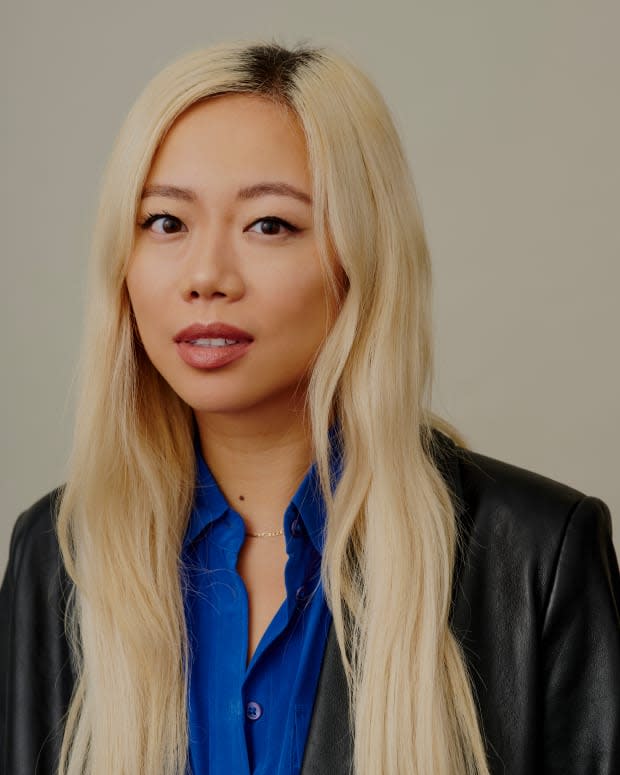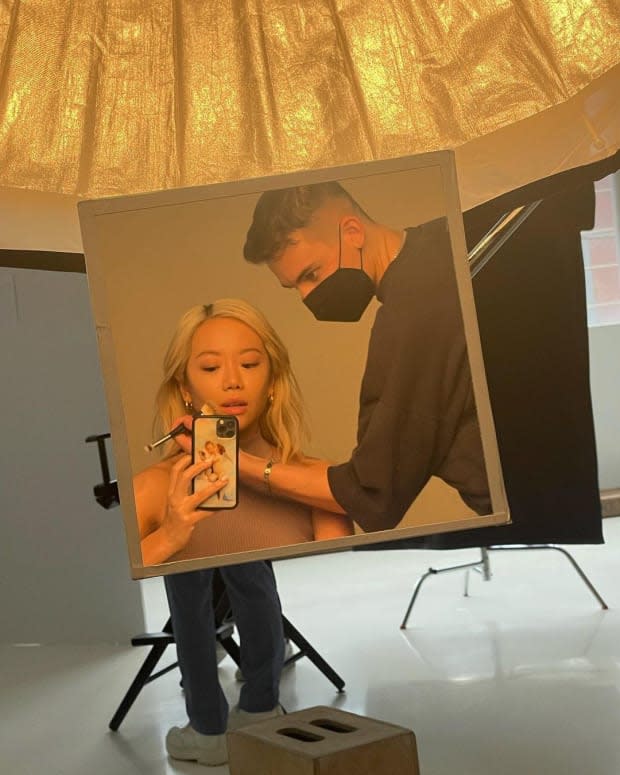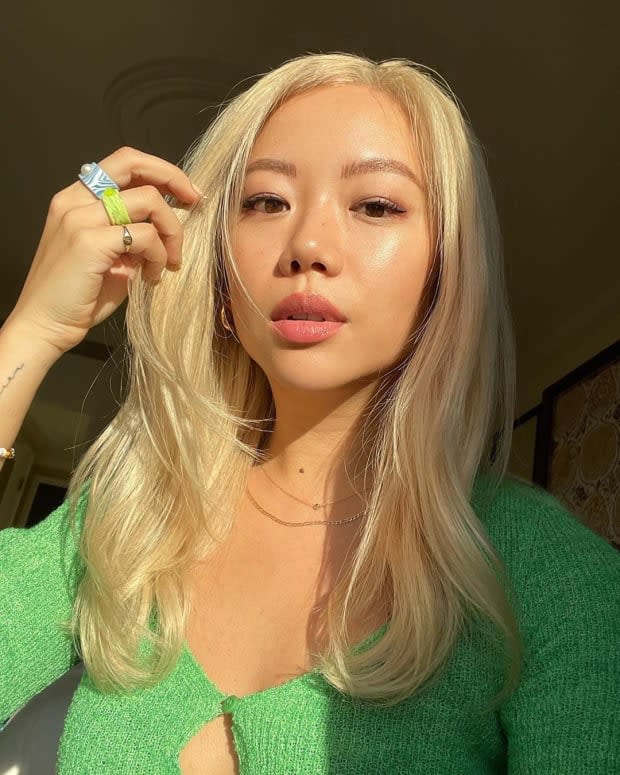How Faith Xue Went From Celebrity Website Ghostwriter to BDG Executive Beauty Director
The beauty industry and digital media veteran reflects on her timely career trajectory, beating media's "click" fatigue and where things are headed in the future.

Photo: Nyra Lang/Courtesy of Faith Xue
In our long-running series "How I'm Making It," we talk to people making a living in the fashion and beauty industries about how they broke in and found success.
Faith Xue is a lot of things — the executive beauty director at Bustle Digital Group, a writer, an early adopter of everything digital an amateur pro at applying cool eye makeup — but first and foremost, she is her mother's daughter.
Born to two first-generation Chinese immigrants, some of Xue's earliest memories are of her mother getting a job with Mary Kay when the family relocated to Missouri for her father's master's program. She recalls watching her mother dig through her makeup box, following her every move, when I ask about her earliest beauty memories.
"I still remember the little samples of eye shadows that were on [the Mary Kay] cards, and I thought they were the coolest thing ever. I was so precious with them," she shared with Fashionista during a Zoom call for this interview. "I grew up watching her do a 10-step-plus routine, and that was her moment at the end of every day to have for herself. Little me would be sitting on the bathtub watching her do her toners, and lotions and microcurrent before NuFace was a thing. It was just this moment where I was fascinated, where she was really taking care of herself. My mom always ingrained in me that beauty is not frivolous. I feel like that was such a blessing for me that I always approach beauty from this perspective."
But while an appreciation for beauty was modeled for her at home, growing up as a magazine-obsessed teenager in homogenous middle America made Xue hungry for a different, more authentic and rewarding landscape. The timing couldn't have been appropriate: Before the influencer marketing industry was projected to reach more than $16.4B by 2022, and digital channels changed the way we consume forever, Xue landed her first job out of college as a ghostwriter for editorial content for celebrity websites. There, she was steeped in Google Analytics (where understanding web traffic, where it comes from, and how to optimize a story for it became second nature), and was able to be one of YouTube trailblazer Michelle Phan's first-ever employees and collaborators.
The experience shifted and reinvigorated her plans for the future, building a deeper understanding of the impact she could make in the media landscape should she stay the course.
As the executive beauty director at Bustle Digital Group — where she oversees its lifestyle portfolio inclusive of Bustle, Nylon, TZR, Elite Daily, Scary Mommy and Romper — Xue has ridden every new media wave, evolving with the industry and broadening its sense of purpose and creativity. Fashionista caught up with her after celebrating her first year with the company to discuss her timely career trajectory, beating media's "click" fatigue and the future of the industry.
Set the scene for us on how you grew up in relation to media and beauty in particular.
Growing up, in terms of seeing myself represented in the magazines that I was obsessed with, that never happened, so I would hoard magazines. I had a drawer that I would [keep] of magazines because I would never throw away a single one, and I had all the subscriptions. I don't even think I realized, at the time, that I was reading everything and not seeing anyone who looked like me in these pages. But I do remember, any time there was an Asian model — there was always one token Asian model in a spread — or a feature on 'cool girls,' I'd instantly read hers first and desperately try to feel like there was something in her story or profile or the way that she looked that would resonate with me.
How were you able to move past not seeing yourself in the magazines that you loved to realizing that you could actually have a career in the field, and specifically in media?
I think that it was so fortunate. All I wanted to do was be an editor. I was living in L.A., so the options were limited. My parents basically said, 'You have one month to find a job after college, or else you're moving home.' Which now I realize was an empty threat, but basically, at the time, I was like, 'Oh my God. I can't move back to Seattle. I have to find something.'
So I basically said 'yes' to this six-week-long assistant editor job at a digital agency. It was very ahead of its time, I will say. We were writing editorial content for celebrity websites. I was able to see sort of how editorial worked, but definitely digital, like social media, was always part of it.
What was a big turning point for you in that role?
That's when I first started working on Michelle Phan's website. And Michelle was not only an Asian American woman, but such an OG of this beauty influencer movement. She was making videos on YouTube of her turning green tea into ice cubes and putting them on her face as a facial treatment before 'hacks' were even a thing. I definitely think working for someone who was very inspiring, seeing a strong, powerful Asian American woman's face on the billboard in Times Square, was really inspiring for me.
But honestly, I just think the more that I worked in the industry, I realized how impactful beauty was and how seeing someone who looked like you in a beauty editorial — or even a roundup of different hair types — how feeling seen can actually affect your self worth.

How did being able to work with someone like that, so ahead of the times, help evolve your understanding of the industry and how it best thrives?
I just saw the impact that [Michelle] had on people's lives. This was before influencers were a thing, so I was just shocked to see millions of people in the world watching her videos and being like, 'This video was an escape for me,' or, 'I learned something that changed a feature that I've always been self-conscious about.' So, I really do think that it helped me not only understand the power of community, but also the power of vulnerability in beauty.
I think seeing Michelle grow on YouTube as this new platform was really eye opening for me, and I think made me less resistant when things like Instagram started and TikTok started, to just being like, 'Alright, this is the way of life.' Technology and beauty are intersecting. And so we can either try to be resistant to it and get stuck in our ways, or we can just figure out how we use [these] platforms to spread our message.
When you took the helm at Byrdie, what were a few of your key priorities in terms of making sure you and the team were paving the way for the future of beauty and how we as a society talk about it?
In my first few years at Byrdie, it was launched as, supposedly, a very luxury beauty site, and that kind of changed throughout the years. But at the time, 'luxury' meant we were using mostly white models with straight hair who were very thin. It was something that I think I internalized. And a lot of things happened in the past year or two with Stop Asian Hate, where I realized that maybe these experiences made me feel like I had to be more white-adjacent in order to either see myself or in order to fit into mainstream media.
I was promoted to editorial director of Byrdie when I was 25 years old. Obviously, it sounds incredible, and I'm so grateful to my boss and mentor, Alex Taylor. She was president of Clique at the time, and she was very supportive of me in my career.
But obviously, thinking back to when [I was] 25 years old, I had no leadership skills. I suddenly was thrust into this role of being like, 'You're going to define the vision of this website.' And I was like, well, where do I draw from? What's the goal? Am I trying to make us the biggest beauty website? Am I trying to grow traffic? Am I trying to feature diverse voices?
It really was me figuring it out as I went. I will say that I think it took me a bit of time, to be completely honest. I admire people who are promoted to leadership positions and, instantly, they're trailblazers and they're going to change direction, and diversify, and bring on new voices. To be honest, it took me a year or two to really find my own voice.
How did you decide to move forward from that?
I think it was probably 2016 when I was like, 'You know what? We really have to figure out what our voice is, why we exist as a beauty site. Is it just to speak to the same people that we've been featuring and the same models that we feature? Or is it really for the whole diverse world out there of people, like myself, growing up.'
I think of young Faith back in the day, being in Seattle, Washington and being the only Asian person and being so excited any time I saw an Asian model or an Asian celebrity on a page of a magazine. Never on the cover, but just on a page. That would've changed my life if I'd seen more representation. So I definitely think it took me awhile, and I'm going to be honest about that. But there was a moment in time where suddenly it was: No. Nothing is more important.
As an editorial director, you're working on not only overseeing editorial operations, but also social strategy, events and so much more. I'd love your perspective on the evolving leadership roles in media today, especially in digital.
So much of what I learned at Byrdie, I've been so excited that I've been able to bring over to my role at BDG. This is the world that we live in. I do think it's good for editors to be well rounded and to understand how to put together a long-term strategy, and how to understand SEO and growth, and how to understand social, and to understand how to put together a live event. These are all skills that editors did not [have] back in the day.
How was that a departure from what you'd done previously?
It's always been very focused on what's going to get the most clicks, what's going to give us the biggest moment on social. It's nice to just go back to what made me want to start in this industry in the first place, which is a love of reading and telling good stories.
It's a lot to be an editor and have to rely solely on clicks. What advice would you share for navigating that?
It's a good question. I think that it's so easy to get stuck in this cycle, like you said, of chasing clicks because [that's] what's driving revenue, and that's what's spurring your company forward. But I also think sometimes, for me, it's helpful to just do a digital detox, and read, and just get away for a second. I never feel more inspired than after I read a really good story. So whether that's subscribing to a newsletter from a writer that you love or taking the time to detox and read a book, I think anything you can do to kind of take a step away and then, basically, reinvigorate yourself in that world and feel inspired again is always great.
I think for companies also, it's helpful to realize that you can't expect one editor to do every single thing. I think BDG does a great job of this, where it's like you're not going to expect your editors to do 50 pieces of SEO content on top of writing great features, and on top of doing social content, and product reviews.
Let's talk more about BDG and your start there. What attracted you to the company?
I'd been at Byrdie for seven years. It was like my formative years, and I always said I would never leave Byrdie to go be a beauty director for a website, because that would just seem like going backwards, from overseeing an entire website to just being in charge of a vertical. But it was fortunate timing because my now-boss Emma Rosenblum reached out to me around the same time that I was really thinking, 'What is next in my career?' I was instantly intrigued. I loved all of the sites that are under the lifestyle portfolio, and I honestly saw a bit of myself in all of them.
So one of the first things that I was tasked with when I started here was to help figure out what makes each of the sites' beauty perspectives different from each other. What makes a Nylon beauty story different from a TZR one? Who is the reader that they're speaking to? Who's the reader that we want to speak to?

How have you been able to implement these strategies?
One of the first things I did was kick off a bunch of editorial beauty franchises for all of the sites that I felt really represented their beauty perspective in a nutshell, and also talk about how we can diversify our beauty content as well, and make sure that anytime someone reads a Nylon beauty story or a Bustle beauty story that they feel seen.
For Elite Daily, we launched a new series called They're Lit, which is all about featuring men and non-binary individuals and their beauty routines, knowing the Elite Daily reader is super inclusive, Gen Z and beauty for all. For Bustle, we launched a 7 Days of Skin video series, which was super fun because the Bustle reader loves a celebrity.
There seems to always be a lot of negative discourse going around about the state of media. What would you say to folks who are feeling like they love what they do in editorial or want to become a writer, but they're feeling scared about the state of the industry?
I've always believed that if you really love something, you will find a way to do it and make a career out of it. Yes, the media industry can appear to be unstable because it's gone through so many changes. But there are also, on the flip side, so many roles that exist nowadays that didn't exist five, 10 years ago. Even a social media editor role, or even an editorial producer type of role.
If you love editing or if you want to be an editor, I would say you have to think about why. Is it telling stories? Is it because you want to see your name in print? Which, no judgment. That was definitely a part of the reason, that was definitely a draw for me. It's that feeling of, you're impacting the cultural conversation in some way. But also know that there's so many other ways that you can tell your story, too.
And for anyone who's discouraged and thinking like, 'Oh, I have to start as an editorial assistant, and then become an assistant editor, and then that's how I get my foot in the door.' We don't live in that world anymore. I just went through intern resumes, and we're hiring an intern for the summer. I was intrigued by a candidate who had a beauty blog or worked with a brand on their TikTok account. If you do want to work in media, there's so many different avenues that you can experiment with without having to just go that traditional route. And I think my career trajectory is probably proof of that.
This interview has been edited and condensed for clarity.
Never miss the latest fashion industry news. Sign up for the Fashionista daily newsletter.

